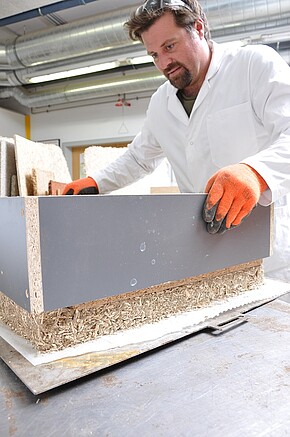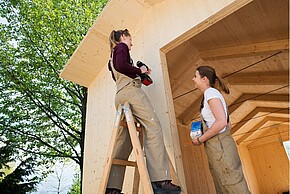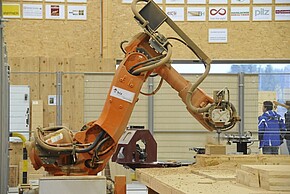


The efficient use of material and energy resources is increasingly becoming a challenge for the development of our economy and society. One way for companies to respond to this situation in a targeted manner is to develop new materials and products from sustainably available resources. Since wood grows back in the forests and in the course of its growth trees also play an important role in our quality of life (e.g. purifying water and air), this renewable resource, its versatile use and application hold great potential for the future.
In addition to the improved use of wood as a resource, the improvement and renewal of technologies and processes in terms of profitability and efficiency (in terms of energy and material use) is also an important factor for companies.
The Master's degree programme in Forest Products Technology & Timber Constructions responds to this challenge in a targeted manner: Experts will be equipped with skills in this field to help lead businesses in terms of resource efficiency, innovation, and sustainability. Already during their studies, students work on supporting companies in the continuous improvement and renewal of technologies and processes. The scientific and social-communicative skills necessary for managers are taught in depth throughout the entire program.
The Master's programme offers students in-depth competencies in several respects: First, a more specific technical education that combines wood technology, wood industry and wood construction expertise with scientific content. Furthermore, a course of studies that includes the aspects of project orientation, team and leadership work as well as interdisciplinary and scientific work. Working on projects from the beginning of the study programme reinforces applied learning and the acquisition of competencies. These projects become more and more complex as the degree programme progresses and, upon request, are also carried out on an interdisciplinary basis in collaboration with the Design & Product Management (dpm) and Smart Buildings in Smart Cities (smc) degree programs at the Salzburg University of Applied Sciences.
Starting in the second semester, you can choose between two specialisations: Forest Products Technology or Timber Construction.
In the fourth semester, a written master's thesis is to be completed. Topics for the thesis are derived from current research and development topics or projects with companies.
Among other things, the master's programme provides the foundation for working in a scientific environment. Further qualifications such as doctoral studies at various partner universities are possible.
